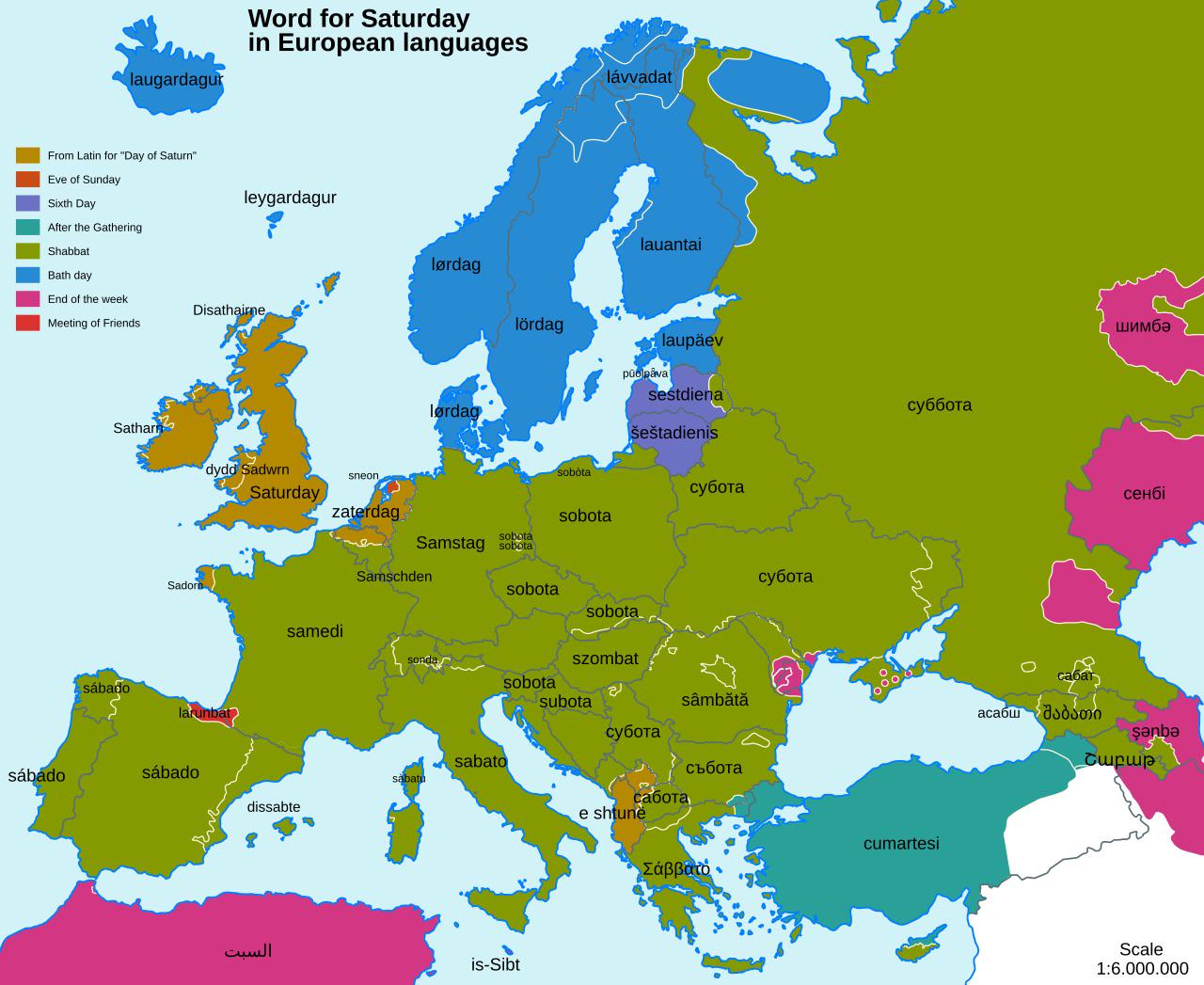Etymologies of Saturday in Europe Map


Marcus Rodriguez
Historical Geography Expert
Marcus Rodriguez specializes in historical cartography and geographic data analysis. With a background in both history and geography, he brings unique...
Geographic Analysis
What This Map Shows
This map visually represents the etymological origins of the word "Saturday" across various European languages. Each country is color-coded to indicate the linguistic roots of the term, highlighting the fascinating connections between language, culture, and history. While many may see Saturday as simply the day of rest or leisure, its name carries a rich tapestry of meanings and histories that reflect the influences of ancient civilizations, religious practices, and regional dialects.
Deep Dive into the Etymology of Saturday
The word "Saturday" derives from the Latin term "dies Saturni," which translates to "day of Saturn." Saturn was a significant figure in Roman mythology, associated with agriculture, wealth, and liberation. This connection to a deity is not unique to English; many European languages share similar etymological roots. For instance, in Italian, Saturday is referred to as "sabato," derived from the Hebrew "Shabbat," meaning rest. This reflects the Jewish influence on the Roman calendar and highlights how ancient practices shape modern language.
Interestingly, in the Germanic languages, we see a different pattern. In German, Saturday is called "Samstag," which again has links to the Hebrew term. This illustrates how the Jewish tradition of observing a day of rest and worship crossed linguistic boundaries, influencing the names of days across Europe.
In contrast, the Slavic languages often incorporate the word for "day" along with a different cultural context. For example, in Russian, Saturday is "суббота" (subbota), which also derives from the Hebrew word for rest. It’s fascinating to see how these languages have retained such deep-rooted connections to their religious and cultural histories.
Moreover, the etymology extends beyond just the word itself. The practices and traditions associated with Saturday, whether it’s a day for markets, gatherings, or religious observance, vary across cultures, but they all share this underlying linguistic heritage. The linguistic evolution of Saturday illustrates how history and culture intertwine through language, and how these connections continue to influence societal norms.
Regional Analysis
Looking at the map, we can see distinct patterns in the word for Saturday across different regions of Europe. In Southern Europe, countries like Italy and Spain exhibit strong ties to the Latin origins, with "sabato" and "sábado" respectively. This reflects the heavy Roman influence in these areas, where Latin evolved into the Romance languages.
Moving north to the Germanic regions, we find countries like Germany and the Netherlands using similar terms—"Samstag" and "zaterdag"—both hinting at the Hebrew roots. However, the contexts in which these names are used can differ significantly. For instance, in Germany, Saturday is often a day for shopping and social gatherings, while in the Netherlands, it can signify the start of the weekend's festivities.
In Eastern Europe, the Slavic languages diverge even further. Countries like Poland, where Saturday is "sobota," emphasize the day as a time of rest, reflecting the cultural significance of the Sabbath. This variation highlights how regional practices and beliefs can shape the vocabulary used to describe the same day.
Significance and Impact
Understanding the etymology of Saturday is more than just a linguistic exercise; it opens the door to exploring how culture and history shape our daily lives. The names we use for days of the week are steeped in tradition, reflecting the values and beliefs of societies throughout history. Moreover, as globalization continues to influence language and culture, it raises questions about how these traditional names might evolve in the future.
What’s fascinating is that while the etymological roots of Saturday remain relatively stable, the cultural practices associated with it are shifting. In many parts of Europe, there’s a growing trend towards secularization, which might influence the way we perceive and celebrate the weekend. The rich history encapsulated in the word "Saturday" serves as a reminder of our shared heritage, even as we move towards a more modern interpretation of time and culture.
In conclusion, the etymology of Saturday is not just a linguistic curiosity; it represents a confluence of history, culture, and religion that has shaped European societies. As we look to the future, it will be interesting to see how these connections evolve or remain intact amidst the changes brought by modern society.
Visualization Details
- Published
- August 29, 2025
- Views
- 78
Comments
Loading comments...